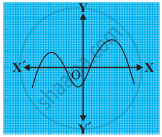Advertisements
Advertisements
Question
If the zeroes of the quadratic polynomial ax2 + bx + c, c ≠ 0 are equal, then ______.
Options
c and a have opposite signs
c and b have opposite signs
c and a have the same sign
c and b have the same sign
Solution
If the zeroes of the quadratic polynomial ax2 + bx + c, c ≠ 0 are equal, then c and a have the same sign.
Explanation:
The zeroes of the given quadratic polynomial ax2 + bx + c where c ≠ 0, are equal.
If coefficient of x2 and constant term have the same sign i.e. c and a have the same sign.
While b i.e., coefficient of x can be positive or negative but not zero.
Consider,
(i) x2 + 4x + 4 = 0
(ii) x2 – 4x + 4 = 0
APPEARS IN
RELATED QUESTIONS
The graphs of y = p(x) are given in following figure, for some polynomials p(x). Find the number of zeroes of p(x).

If -4 is a zero of the polynomial
If -2 is a zero of the polynomial
If the sum of the zeros of the quadratic polynomial
Find the zeroes of the quadratic polynomial
If the zeroes of the polynomial
Consider the following statements.
- x – 2 is a factor of x3 – 3x² + 4x – 4.
- x + 1 is a factor of 2x3 + 4x + 6.
- x – 1 is a factor of x5 + x4 – x3 + x² -x + 1.
In these statements
The number of polynomials having zeroes as -2 and 5 is ______.
The zeroes of the quadratic polynomial x2 + kx + k, k ≠ 0 ______.
If α and β are the zeroes of the polynomial x2 – 1, then the value of (α + β) is ______.
